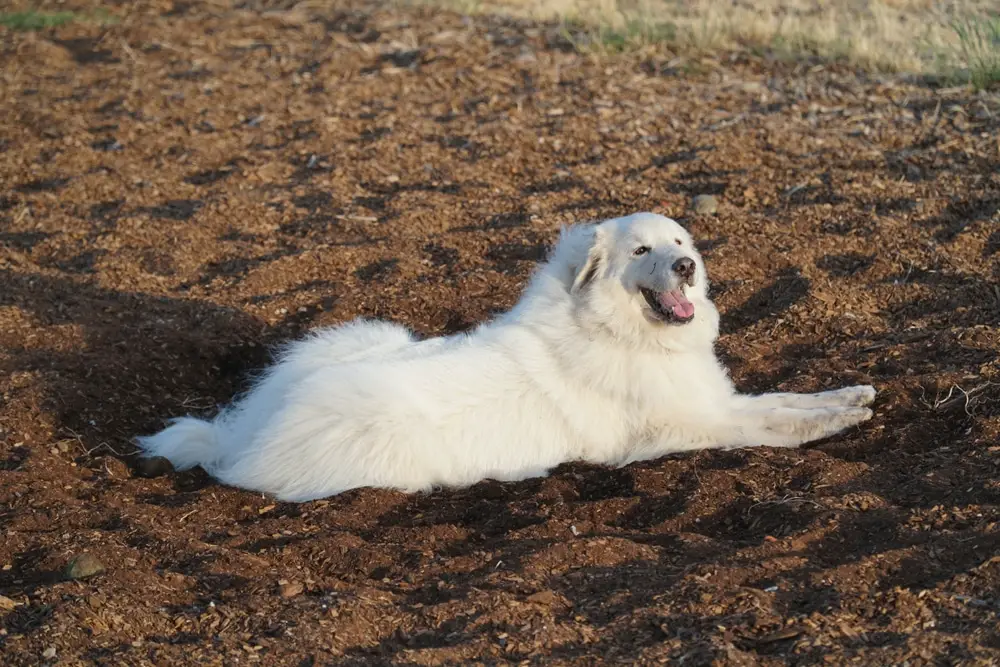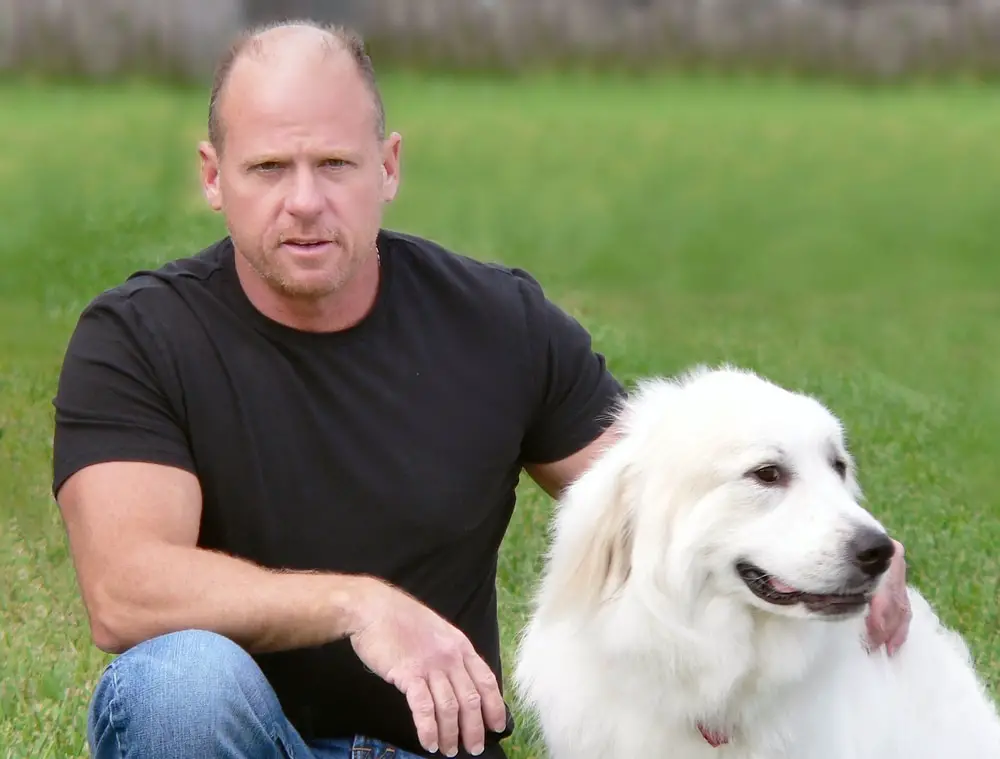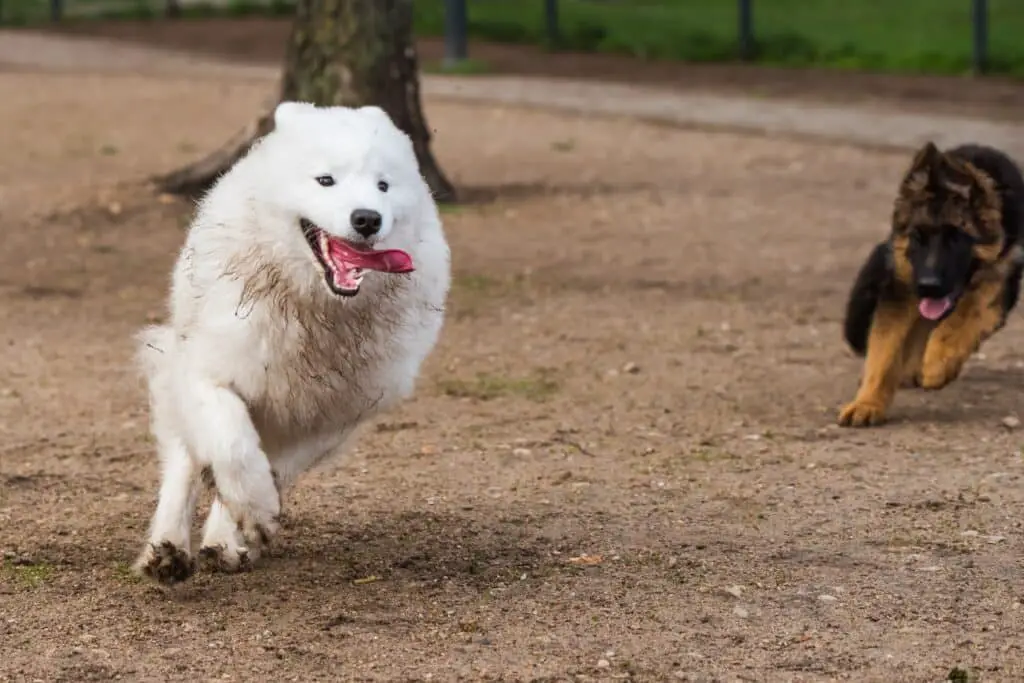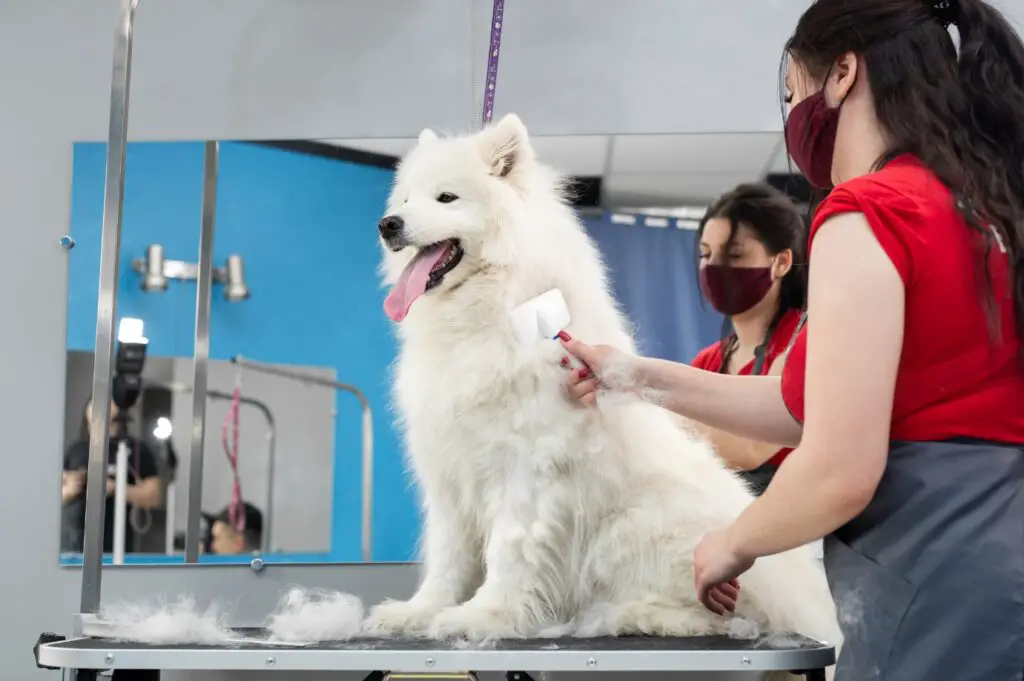The Great Pyrenees and Samoyed are both beautiful, fluffy white dog breeds with charming personalities and a long history.
This article will compare the pros and cons of each breed if you’re stuck deciding between the two. By the end of this article, you should be able to make an informed decision about which one to bring home.
We’ll cover everything from their temperament, training, exercise, grooming, and health considerations. We’ll also discuss some of their behaviors you should be aware of that need to be managed. Let’s get started!
Origins and History
Great Pyrenees
Historians believe that the Great Pyrenees was developed in Central Asia nearly 4,000 years ago. The breed was initially used as a flock guardian in the French province of Aragon. Which is now known as Pyrénées-Atlantiques.
During this time period, their chief purpose was to protect flocks from predators like wolves and bears.
As people began migrating to Europe from Central Asia, they brought with them their herding dogs – which evolved over time into what we now know as the Great Pyrenees!
Samoyed
The Samoyed is a stunning, fluffy white dog with an intriguing past. Its origins date back to Siberia in the 19th century, where nomadic Samoyedic reindeer herders bred them as working dogs.
The Samoyeds were used to pull sleds and keep the herder’s tents warm by sleeping near them at night. Later, these herding white dog breeds began accompanying Siberian explorers on Arctic expeditions.
The breed was officially recognized in England in 1909 and later brought to America for show purposes.
Size and Appearance
Great Pyrenees
The Great Pyrenees is one big pup, standing around 25-32 inches tall and weighing 85-100 pounds. They have thick double coats that are usually pure white or cream in color, with some brown markings on the ears or face.
The coat is long, water resistant, and has an extra layer of wooly fur underneath for extra warmth during cold winter days.
Samoyed
Samoyeds can range between 19 – 23.5 inches in height and typically weigh anywhere from 35 – 65 pounds when fully grown. Their coats are medium length with long, fluffy fur around their face, neck, and tail that can come in shades of white, cream, or biscuit colored.
Their ears stand erect on top of their head in terms of physical features such as ears and eyes. While their eyes are usually dark brown or black with an almond shape.
Temperament
Great Pyrenees

The majestic Great Pyrenees is an excellent companion for the right family. With their noble and protective temperament, they can make excellent watchdogs and loyal companions.
These large white dog breeds are beloved by many for their courageous, loyal and affectionate nature. Despite their size, these gentle giants are incredibly easy-going and often bond firmly with children due to their patient demeanor.
“They tend to be very laid back but do require interaction throughout the day, so it’s important that potential owners have plenty of time to give them attention.”
Samoyed
If you’re looking for a furry companion who loves to explore and is always up for an adventure. Look no further than the Samoyed! This fluffy pup is one of the most cheerful white dog breeds around.
They are known for their playful nature and friendly demeanor. Not only that, but they can also be quite vocal when expressing their emotions!
The Samoyed is a loyal dog who will happily follow its owner anywhere they go. Always keep them on a leash, as they tend to get easily distracted while exploring.
They love being around people and other animals, so having someone in the family or another pet in the house makes them even happier.
It’s important to remember that these dogs need plenty of exercise and mental stimulation every day. Otherwise, it can lead to destructive behavior due to boredom.
Protectiveness
Great Pyrenees
The Great Pyrenees is known to have a strong protective instinct. As a true guardian of the home,
They are very alert to their surroundings and bark to alert you when they sense something out of place. They make excellent watchdogs and love being around people and are devotedly loyal to their owners, providing comfort in times of need or distress.
“They have a very unique look with their white fluffy coat and kind eyes that seem to be always looking out for danger.”
With proper training, the Great Pyrenees can be counted on as your protector in any situation – making them one of the most dependable dogs around!
Samoyed
These dogs are known to have strong guarding instincts, making them incredibly devoted and alert when it comes to protecting their loved ones.
Not only are they fiercely dedicated, but Samoyeds are also incredibly intelligent and intuitive animals. They can easily pick up on the emotions of their owners, which allows them to sense when danger may be present.
With the combination of their loyalty, intelligence, and protectiveness, these fluffy canines make ideal guardians who will do anything to keep their families safe!
Overall Strength
Great Pyrenees
The Great Pyrenees is an ancient working dog breed that has been around for centuries. This large, loyal canine was bred to protect livestock and property, making it one of the most potent white dog breeds today.
The Great Pyrenees are like no other breed as they have the ability and strength to handle harsh weather easily. This impressive dog has a natural suspicion toward strangers and fiercely defends its family when threatened.
“With an intimidating size, broad head, and double coat of long white fur, it’s easy to see why this pup is so strong!”
Not only do they have a thick coat that helps them stay warm in cold temperatures, but they also have incredibly powerful jaws that allow them to take down predators if needed.
Overall, the Great Pyrenees is one of the strongest white dog breeds out there with its combination of physical attributes and protective instincts.
Samoyed
The Samoyed is known to be one of the strongest and hardest white dog breeds of dogs. With their thick white fur and friendly demeanor, they are sure to make any pet owner proud.
Known as sled dogs in their native Siberia, the Samoyed is an incredibly strong breed designed to pull heavy loads over long distances in cold climates.
They have large heads, broad chests, and powerful legs, making them perfect for mushing or dog sledding. Their thick double coats protect against the coldest temperatures making them ideal for outdoor activities in snowy weather.
Bite Strength
Great Pyrenees
The Great Pyrenees has a strong bite which can be pretty intimating; for this reason, they used to protect livestock and property for centuries.
With a bite force of up to 500 pounds per square inch (PSI), the Great Pyrenees isn’t one to mess with.
The full-grown size of this breed alone is enough to scare off any would-be intruder, but when backed by their impressive PSI, it makes them even more effective as watchdogs.
They have broad heads with powerful jaws that can easily crush bones if necessary – yet they are also gentle giants who love their human family members unconditionally.
“Their strong bites combined with loyalty and intelligence make them great companions for families or farms in need of protection from intruders or predators.”
Samoyed
The average Samoyed bite pressure comes at around 320 pounds per square inch (PSI). This puts them in the middle of the range breeders typically look for when considering their strength.
That means they won’t be as powerful as some breeds like Rottweilers or Pit Bulls, but they aren’t pushovers either!
You can also rest assured that Samoyeds are generally quite gentle and make wonderful family pets even with such a powerful bite.
Training Needs
Great Pyrenees

The Great Pyrenees is a breed of dog with some unique training needs. Known for their calm, gentle and independent nature, the Great Pyrenees makes for a fantastic companion.
However, when it comes to training, there are some important points to keep in mind. First and foremost, patience is key! These dogs are known for being slow learners, so don’t expect miracles overnight.
Instead, be consistent with your commands and reward your pup when they do something right – this will help reinforce the behavior you want to see more of.
Additionally, positive reinforcement goes a long way with this breed – using treats or toys as rewards rather than punishment or yelling is much more effective when teaching them new tricks or commands.
Lastly, make sure that each session is short and sweet; otherwise, your pup will become distracted quickly due to its short attention span.
Samoyed
The Samoyed is a very loyal dog who loves its family and needs lots of love, attention, exercise, training, and socialization.
Training should start with positive reinforcement techniques such as reward-based treats as soon as possible. Ideally, the puppy should attend obedience classes or have a professional trainer teach them proper commands.
The Samoyed is often quite stubborn, so patience is vital when it comes to training them. With consistent practice of commands and good behavior rewards, your pup will be well on its way to becoming an obedient pet!
Exercise Requirements
Great Pyrenees
While the Great Pyrenees are loyal pups that make excellent guard dogs, they also enjoy being active and need regular exercise to stay happy and healthy.
“As an intelligent breed, the Great Pyrenees can adapt to different kinds of exercise routines including walking, running, swimming, or playing fetch.”
To meet their daily needs for physical activity, you should give them at least 45 minutes to an hour of moderate exercise each day to keep them fit and content.
When outdoors with your pup, ensure they are kept on a leash since this breed tends to wander off if left unchecked!
Samoyed

When it comes to exercise, an hour to two hours of playtime per day will keep your Samoyed happy and fit.
Try different activities such as walks in the park or hikes on trails that are appropriate for his age and size. Off-leash running or playing fetch are great ways for them to get their daily dose of energy out.
The more active, the better – take your pup swimming at a lake or river if there’s one nearby too! It’s important for physical health and mental stimulation for your pet.
Dog Friendliness
Great Pyrenees
The Great Pyrenees are known to be independent and can sometimes show aggression toward unfamiliar animals, particularly of the same sex. However, they will be gentle and loving with those they know well.
They make great additions to any family with one or more pups in their house. The Great Pyrenees have traditionally been bred as guard dogs, so they will protect your other pets if needed.
This makes them reliable friends who can always look after those they love.
Samoyed
Samoyed, A friendly dog known for being good with other dogs. Making them ideal for families with other canine friends in their homes or those planning on getting one.
The Samoyed’s coat may be thick and white, but their personality is anything but cold! They love socializing with other canines and humans alike.
“The breed tends to get along well with all animals, regardless of size – they don’t discriminate! A Samoyed will quickly become the life of any doggie party.”
These gentle giants are super loyal and devoted to their owners, too, so don’t be surprised if you see your pup following you around wherever you go!
Child Friendliness
Great Pyrenees
The Great Pyrenees is one of the dogs’ most friendly and gentle white dog breeds. It is a large, white-cream-colored livestock guardian that has become increasingly popular as a family pet.
Not only are they beautiful, but they also possess an easygoing nature that makes them great with children. These loyal companions can be very devoted to their human families and will protect children from any harm they may encounter.
They are also known for their patience and calm demeanor, which make them ideal pets for young kids who love animals but may not yet understand how to interact with them appropriately.
Great Pyrenees enjoy playing with kids and can spend hours outdoors running around in the yard or playing fetch in the park.
They are content just being close to their humans, especially when cuddling on the couch after an exhausting day at school or playtime outside!
Check out the following video, which shows how friendly the Great Pyrenees is with babies!
Samoyed
The Samoyed is a gentle, intelligent breed that loves cuddling up on the sofa or participating in active outdoor activities with its owners.
They have an excellent capacity for learning new commands and tricks, making them an ideal playmate for young ones. The breed has an affinity towards children that makes it a great companion for those with families.
“The Samoyed displays loyalty and devotion that can’t be matched – it’s almost like having your own little guardian angel!”
With regular exercise and plenty of love, this gorgeous pup will become a treasured member of your home in no time.
Great Pyrenees vs Samoyed – Intelligence
Great Pyrenees
The Great Pyrenees is highly intelligent and adapts easily to different environments and routines. They are also eager learners who enjoy training- always up for a challenge!
In addition, they possess an almost supernatural sense of awareness regarding their surroundings; they seem to know danger before it even arrives.
Their loyalty and protective nature make them excellent guard dogs, while their intelligence makes them great companions.
Samoyed
When it comes to smarts, the Samoyed Dog is right up there at the top of the list! This ancient dog breed is known for its intelligence, loyalty, and trainability.
They are incredibly quick learners and can understand commands easily after just one or two repetitions.
The Samoyed also has a great memory – they remember things for a long time and can easily recall commands even after months of not practicing them.
Not only that, but this breed is full of problem-solving abilities. They’re able to figure out puzzles quickly, often choosing creative solutions in order to get their reward.
Great Pyrenees vs Samoyed – Nutrition
Great Pyrenees
As an active working breed with a large frame, the Great Pyrenees needs nutrient-dense foods to keep them in tip-top shape.
When choosing food for your four-legged friend, look for high-quality kibble that includes protein sources such as chicken or beef and healthy fats like fish oil.
Fruits and vegetables are also important to include in your pup’s diet – sweet potatoes and apples are great options! Whole grains are another essential source of nutrients; try introducing oats or brown rice into their daily meals.
Samoyed
It’s important that a Samoyed receives all the nutrients they need for a healthy lifestyle. A high-quality diet will provide them with balanced nutrition and help to keep their coat in good condition.
They should have food specifically designed for medium-sized dogs with high activity levels.
Look out for foods containing fish or poultry and some carbohydrates, such as rice and barley. A high-quality dry dog feed mix and plenty of fresh fruits and vegetables for added vitamins and minerals are recommended.
Great Pyrenees vs Samoyed – Grooming Requirements
Great Pyrenees
While many pet owners are drawn to the Great Pyrenees for their size and gentle nature. They may not know the grooming requirements associated with owning one.
“Great Pyrenees have thick, dense coats that require regular brushing in order to prevent mats and tangles.”
The coat should be brushed at least once to twice per week and more often during periods of shedding. It’s also important to bathe your Great Pyrenees regularly in order to remove dirt and debris from their coat and keep it looking shiny and healthy.
Nail trimming should also be done regularly, as overgrown nails can cause discomfort or pain when walking or running.
Samoyed

This beautiful and iconic dog breed has specific grooming needs that should be respected to keep them looking their best.
The Samoyed’s thick double coat requires regular brushing – at least once or twice a week – to prevent matting and over-shedding.
You can also use an undercoat rake during seasonal shedding periods, as it will help to remove the loose fur from the undercoat and reduce the amount of hair flying around your home.
Giving them a bath when needed is necessary because they can self-clean themself with regular brushing.
However, when bath time does come around, make sure to use a gentle shampoo specifically designed for dogs to avoid irritating their skin.
Great Pyrenees vs Samoyed – Are they Healthy?
Great Pyrenees
Unfortunately, like all breeds of dogs, the Great Pyrenees are prone to certain health conditions due to their genetics.
You should know common problems, including hip dysplasia, elbow dysplasia, entropion (eyelid turning inward), and progressive retinal atrophy (PRA).
It’s necessary to monitor their diet unless they will suffer from bloat (gastric torsion) and hypothyroidism.
Samoyed
While Samoyeds are generally healthy dogs with no significant genetic problems, they are susceptible to certain health conditions that owners should be aware of.
“One common issue for the Samoyed is hip dysplasia, a condition in which the thighbone does not fit correctly into the hip joint socket.”
This can cause lameness or arthritis-like symptoms in adulthood which can cause ongoing pain.
Owners should ensure their pup’s diet includes enough calcium to support healthy bone growth and look for any signs of pain or limping that might signal further medical attention is needed.
Life Expectancy
Great Pyrenees
The average lifespan of the Great Pyrenees ranges from 10 to 12 years, depending on their diet, exercise routine, and overall health.
Larger white dog breeds like the Great Pyrenees often have shorter lifespans than smaller breeds due to their size and possible underlying health issues.
However, with proper care and routine vet visits, they can easily surpass the average lifespan and reach 15 years or more!
Regular exercise helps keep them healthy and provides mental stimulation, which can help them live longer lives too.
Samoyed
A Samoyed has an average life expectancy of 12-14 years. But they can live up to 17 years if taken good care of them.
It’s important to remember that larger white dog breeds have shorter lifespans than smaller dogs. Their size can slightly reduce their lifespan.
When looking at the lifespan of a Samoyed, it’s important not only for pet owners but also for potential adopters.
After all, no one wants an animal companion who will leave too soon! With proper attentive care and regular vet checkups, your beloved pup can live a long and happy life full of lots of snuggles and smiles.
Puppy Prices
Great Pyrenees
The price of a Great Pyrenees puppy will depend mainly on its lineage and age. If you’re looking for a show dog or one from breeding lines with strong pedigrees. You can expect to pay anywhere from $1,000 – $2,500.
Puppies from average lines tend to be slightly cheaper at around $500 – $1,000, depending on where you live and what breeder you choose.
Regardless of the price tag. It’s important to remember that these pups make wonderful companions, so it’s worth investing in a reputable breeder!
Samoyed
Samoyed puppies can range in price from around $1000 to $3000, depending on their lineage and breeder.
Buying a puppy from a reputable breeder is more expensive than adopting one.
On top of the initial purchase price, additional costs, such as vet bills and food. Also, consider this when budgeting for the new addition.
Overall, Samoyeds are an excellent breed—they’re friendly and affectionate and make great pets for families of all sizes.


